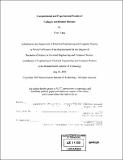Computational and experimental studies of collagen and related diseases
Author(s)
Yang, Chen, M. Eng. Massachusetts Institute of Technology
DownloadFull printable version (20.06Mb)
Other Contributors
Massachusetts Institute of Technology. Dept. of Electrical Engineering and Computer Science.
Advisor
Collin M. Stultz.
Terms of use
Metadata
Show full item recordAbstract
Collagen is the most abundant proteins in mammals, and collagen degradation is a process that may be associated with many diseases. In this research we use collagen-like peptides that model both cleavage and noncleavage sites of collagen type III to study the stability and degradation of collagen as a function of amino acid sequence variation. Molecular Dynamics is used to compute the potential of mean force of these collagen-like peptides and predict their triple helical content. The predicted result is then compared with experimental results from Circular Dichroism spectroscopy. Similar studies are done on mutant peptides of collagen from the Ehlers-Danlos Syndrome type IV.
Description
Thesis (M. Eng. and S.B.)--Massachusetts Institute of Technology, Dept. of Electrical Engineering and Computer Science, 2005. Page 86 blank. Includes bibliographical references (p. 83-85).
Date issued
2005Department
Massachusetts Institute of Technology. Department of Electrical Engineering and Computer SciencePublisher
Massachusetts Institute of Technology
Keywords
Electrical Engineering and Computer Science.